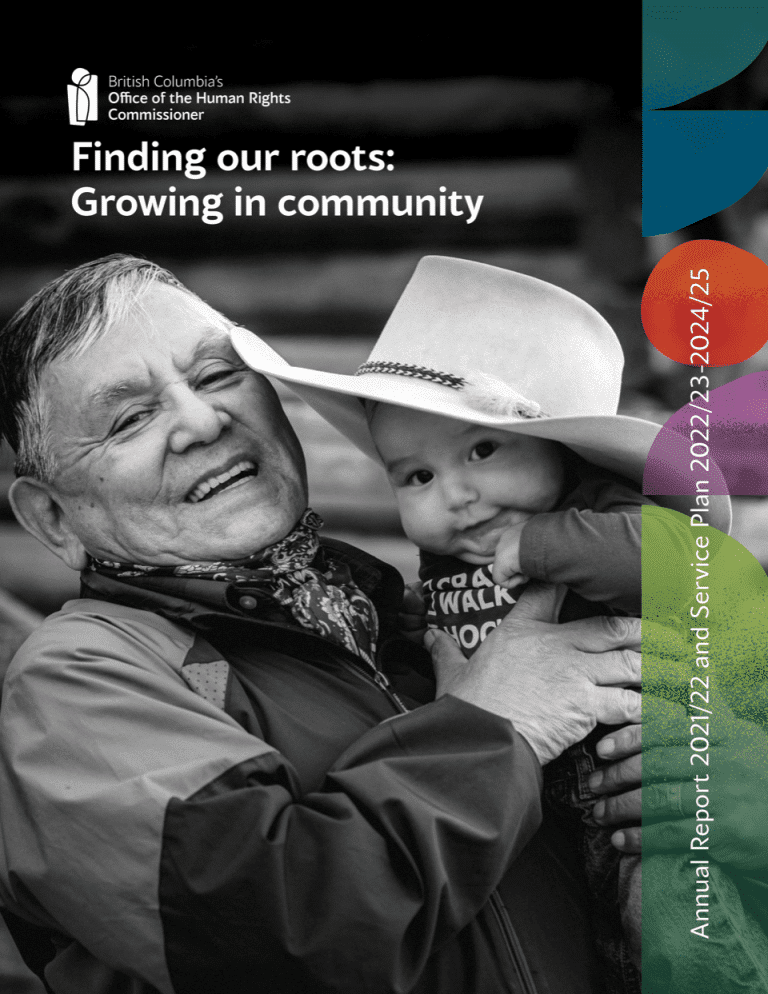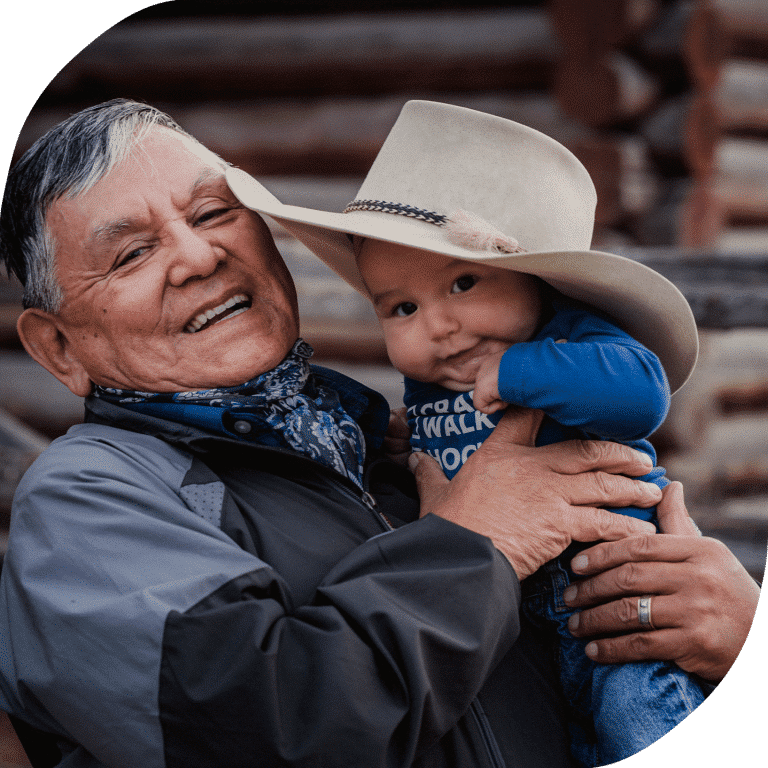A key accountability mechanism for our work is the Commissioner’s yearly budget, service plan and annual report submission and presentation to the all-party Select Standing Committee on Finance and Government Services of the Legislative Assembly of B.C.
A three-year Service Plan (2022/23–2024/25) flows from our Strategic Plan and outlines the objectives and activities we envision undertaking in each of our priority areas in order to fulfill the Commissioner’s mandate.
Our Annual Report (2021/2022) tells the story of our work and outcomes resulting from the previous fiscal year. As we grow as an organization, we plan to use our annual reports as an opportunity to highlight the impact our work is having on human rights, balancing numbers with stories and context to ensure a human rights-based approach to evaluation. We will ask people in British Columbia to work with us to tell our story of change.
More resources

If the version available via this page is not accessible for you, please feel welcome to contact our Office to request a printed copy or another format that meets your needs.
Executive summary
Translations of the executive summary are available in:
عربى (Arabic) | فارسی (Farsi) | Français (French) | हिंदी (Hindi) | 한국어 (Korean) | ਪੰਜਾਬੀ (Punjabi) | Tagalog | 繁體中文 (Traditional Chinese) | 简体中文 (Simplified Chinese) | Español (Spanish) | Tiếng Việt (Vietnamese)
In 2021/22, BC’s Office of the Human Rights Commissioner (BCOHRC) focused on growing—growing our organization, deepening our impact and putting down roots across the province. We have been able to achieve meaningful advances in human rights laws, policies and practices while working towards the deeper behavioural and systemic change that is necessary to achieve our vision of a province free from inequality, discrimination and injustice. Here’s a peek at some of what we’ve been up to in 2021/22:
Strategic priority highlights
2021/22 marks the third year of BCOHRC’s five-year Strategic Plan 2020/21–2024/25, working to achieve impact in our strategic priority areas of: discrimination under B.C.’s Human Rights Code, decolonization, hate and the rise of white supremacy, poverty as a cause and effect of injustice and inequality and human rights protections for those detained by the state. Highlights from our work in these priority areas include:
Discrimination under B.C.’s Human Rights Code
A key reason BCOHRC exists is to ensure that the rights guaranteed by B.C.’s Human Rights Code are protected and respected. In 2021/22 we provided direct information and referrals to more than 20,000 members of the public who contact BCOHRC via phone or email; that’s a 10 fold increase from 2020/21. We managed 45 Special Programs applications (read page 9), delivered a new series of Code workshops to more than 450 people (read page 51) and brought together the most comprehensive analysis of policing and arrest data in B.C.’s history (read page 17).
Decolonization
Our Office is committed to supporting the self-determination of Nations, and working to improve structures that impede the full, equal and just participation of Indigenous Peoples in all aspects of life. In 2021/22 we celebrated an important improvement to B.C.’s human rights system when Indigenous identity was added to B.C.’s Human Rights Code as a protected ground (read page 25). We had the opportunity to deepen relationships with 15 Indigenous nations and many more representative organizations. We heard directly from Indigenous Elders in our Inquiry into hate in the pandemic through our ‘Elders’ Gathering’ and spoke with more than 200 attendees about anti-Indigenous racism at the First Nations Education Steering Committee (read page 53).
Hate and the rise of white supremacy
With the reported rise of hate incidents during the pandemic, our work to eradicate hate in our communities has never felt more urgent. In 2021/22 we launched the Inquiry into hate in the pandemic—the only independent inquiry of its kind in the world—examining experiences of and solutions to hate in our communities (read page 30). We also developed and launched an important Hate Speech Q&A resource (read page 30) and partnered with the BC Association of Broadcasters to launch the province wide Never Accept Hate campaign (read page 28).
Poverty as a cause and effect of inequality and injustice
BCOHRC is committed to working towards effective and meaningful domestic protections for economic rights, engaging with poverty as a human rights issue and dismantling discrimination against people living in poverty. In 2021/22, we continued our work to see social condition added as a protected ground to B.C.’s Human Rights Code (read page 34), intervened before the BC Supreme Court on a key case about family status discrimination with important implications for women’s employment rights and participated in coalition work to secure 10 paid days of sick leave for workers across B.C. (read page 34).
Human rights protections for those detained by the state
BCOHRC believes that we all have the right to be free from arbitrary detention, abuse of power and unfair treatment if we are detained by the police, in correctional centres, under community supervision or in mental health systems. In 2021/22, BCOHRC pushed for culturally safe and trauma informed approaches to substance-use care (read page 40), advocated for improvements to conditions of detention in B.C. correctional facilities and worked towards the end of immigration detention in B.C. jails (read page 42).
Creating a strong and sustainable organization
As an Office only established in 2019, our sixth priority is to build and sustain a healthy and diverse workplace. In 2021/22, we hired 25 people (read page 46), developed an internal education program, delivered Indigenous cultural safety training to all staff and worked closely with Simon Fraser University on sustainable procurement practices to understand the human rights impacts of the items we use and purchase for the organization.
Highlights of our 2021/22 impact
To measure the impact of our work and its consequences for human rights across B.C., BCOHRC has developed an evaluation and impact framework centered on five concepts:
- Building respectful and accountable relationships
- Creating accessible and relevant public education materials
- Providing recommendations to decision-makers on ways to improve systemic human rights issues
- Developing legal arguments to influence case law
- Building human rights-based policies, practices and culture
In each section below you can see highlights from a few key pieces of work that inform our impact evaluation for 2021/22.
Building respectful and accountable relationships
To build trust, we must show accountability. In 2021/22, BCOHRC provided information and referral to more than 20,000 people, continued our work to improve access to B.C.’s human rights system through the ‘No Wrong Door’ project (read page 50), and conducted significant community and Indigenous engagement work across the province (read page 53).
Creating accessible and relevant public education materials
For over seventeen years, the absence of a human rights commission in B.C. has meant that there was a significant unmet need for fundamental public education about the B.C. Human Rights Code. In 2021/22, BCOHRC launched 16 new educational resources on subjects as diverse as a facilitators’ guide on systemic racism to policy guidance on COVID-19 rights and responsibilities. Our ‘Intro to human rights’ video has now been viewed more than 21,000 times, and our new Code workshop attended by more than 450 people so far (read page 55). Our ‘I love my human rights’ video series continued to explore the extraordinary human rights stories of every day British Columbians by launching the heartfelt and moving stories of Brandon Yan, Danny Ramadan and Anthony Brown (read page 57).
Providing recommendations to improve systemic human rights issues
As an independent officer of the Legislature, B.C.’s Human Rights Commissioner provides guidance and recommendations to elected officials and government leaders as well as employers, landlords and service providers in other sectors on ways to ensure these systems cease to disadvantage and discriminate against marginalized communities. Since 2020, BCOHRC has been calling for the province of B.C. to develop legislation to collect disaggregated data. In 2022, that goal was realized through the passage of the Anti-Racism Data Act (read page 61). Significant resources continued to be dedicated to providing human rights guidance in response to the COVID-19 pandemic, including developing resources on proof of vaccination requirements and the ending of B.C.’s mask mandate (read page 62).
Developing legal arguments to influence case law
BCOHRC aims to improve human rights laws and systems in B.C. through the exercise of our legislative powers to hold public legal inquiries and to intervene in court cases that may have a systemic impact on human rights in B.C. This means that the Office can participate in cases to assist the court or the tribunal hearing the case to understand issues related to systemic discrimination and legal principles that otherwise might not be raised by the complainant or the responding parties. In 2021/22, BCOHRC intervened in two court cases: Gibraltar Mines v. Harvey and Neufeld v. British Columbia Teachers’ Federation (BCTF) on behalf of Chilliwack Teachers’ Association (read page 64).
Building human rights-based policies, practices and culture
Across all of our operations, we strive to embody human rights values and our guiding principles in our policies (what we say), practices (what we do) and culture (who we are). In 2021/22, we worked to further integrate human rights principles into our organization’s policies through the creation of a flexible work policy and a specialized counselling policy (read page 67). We also sought to support leadership accountability, organizational growth and employee engagement through our Workplace Environment Survey, incorporating these insights into our strategic planning process.
Looking ahead: 2022/23–2024/25 Service Plan
Our Service Plan (2022/23–2024/25) grows out of our strategic priorities and evaluation and impact framework. It outlines the objectives, key performance indicators and a sample of the activities we envision undertaking over a three-year period to fulfil the Office’s mandate and to establish a baseline for setting future targets.
Some of our activities in the service plan period include launching our Baseline project in twelve communities across the province, delivering a provincial public awareness campaign focused on the rights of people with disabilities, producing a toolkit of resources for employers about employment equity best practices, and conducting an accessibility audit of our current materials to improve access to our work for all people. Our work ahead also includes releasing the recommendations from the Inquiry into hate in the pandemic, continued work on human rights in policing by monitoring for the implementation of the recommendations of the Special Committee on Reforming the Police Act and much more (read page 69).
Budget and expenditures 2021/22
In 2021/22 BCOHRC spent $6.490 million of our $6.815 million operating budget and fully expended our $35,000 capital budget (read page 76). Going forward, in the period covered by our service plan, we have been approved an operating budget of $6.809 million in 2022/23, and the Select Standing Committee on Finance and Government Services recommends to the Legislature that the appropriation for the operating expenditures of the Office of the Human Rights Commissioner be $6.826 million in 2023–24; and $6.839 million in 2024–25 and a capital budget of $35 thousand per year.
